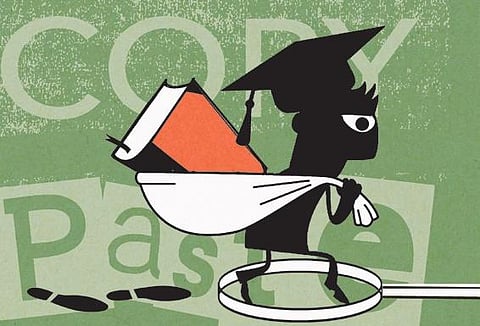

Some years ago, within a few days of assuming office of the Vice Chancellor of University of Delhi, I happened to receive a sealed envelope from a sitting judge of the Supreme Court of India. I was certainly intrigued, but was not prepared for its contents. The venerable judge had written an angry note complaining about how he had detected a blatant case of plagiarism in a doctoral dissertation authored by a research student at the University of Delhi. The judge was an examiner of the thesis. He went on to mention that he was not just angry, but also disappointed because the student’s doctoral supervisor was a senior professor in the Faculty of Law.
I was myself quite disappointed by the incident, but I thought of it as a one-off occurrence. My assumption was rudely shaken when I came upon something very disturbing soon thereafter. It had so transpired that, for about a year before I had assumed charge, a programme of producing inhouse texts had been initiated with much fanfare at the university. Several senior members of our faculty had volunteered to author books and learning material. These texts had been readied by the time I had taken charge. The matter was brought to my notice for approval since there was a significant sum due to the authors as royalty.
On a whim, I suggested that perhaps we must have some random contributions checked for plagiarism through open-source software, which was readily available on the internet. Even though our in-house material had been reviewed by a panel of Indian academics, to my utter disappointment, a significant portion of the contributions turned out to be plagiarised. I had to shelve the entire programme. As an upshot of these misadventures, we had to install some well-regarded and commercially available softwares to detect plagiarism. We also mandated that all doctoral dissertations had to be run through this software before formal submission.
I can state with regret that as time went by, I became aware of more and more cases of plagiarism in several universities. I soon discovered that the problem was more than endemic at the level of our undergraduate institutions where students routinely took material from several sources without acknowledging. This was also a reflection on our teaching faculty, who seemed to be unable to do anything about the matter.
The issue was brought under some control at the University of Delhi because we had initiated several measures. Yet, the occasional googly would come our way even from senior members of our faculty. I recall the case of a senior professor, who had written a major preface to a critical and important programme, which was to be presented at the Academic Council. Since the agenda had been circulated some days in advance, I was embarrassed to learn that almost the entire preface had been lifted from the website of an American university without acknowledgement. When confronted, the professor seemed to not realise the gravity of what he had done.
When artificial intelligence platforms such as ChatGPT were announced, not so long ago, teachers were worried about undetectable acts of plagiarism. Thankfully, the same AI platforms have devised ways and means to detect submissions, which have used technology to aid their efforts. Though plagiarism is, in evidence, a global phenomenon, we in India must be more alert since we are vulnerable for various reasons.
Posts on X (formerly known as Twitter): @DineshSinghEDU
Dinesh Singh
Former Vice-Chancellor, Delhi University; Adjunct Professor of Mathematics, University of Houston, US